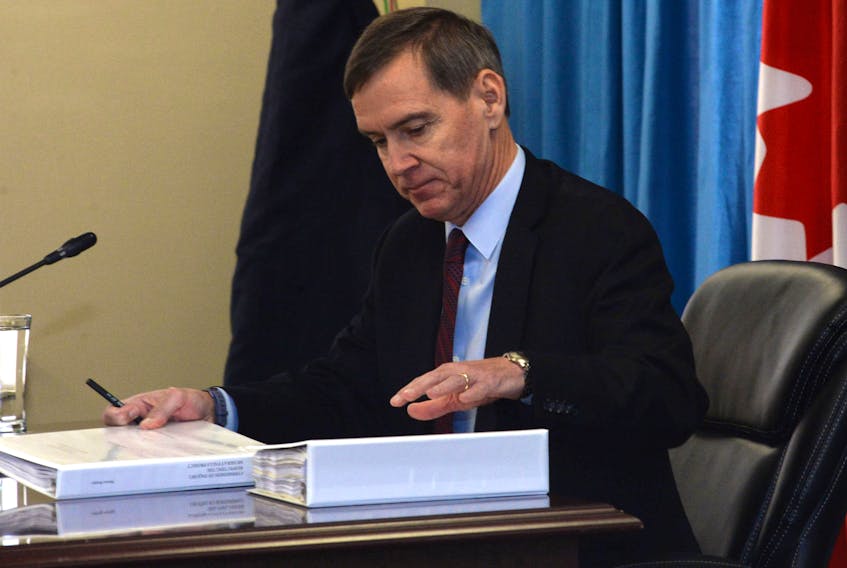The tension started in the morning at the Muskrat Falls Inquiry and broke through at points throughout the day on Wednesday while a provincial government bureaucrat responsible for Indigenous Affairs testified.
Commissioner Richard LeBlanc interjected repeatedly to remind everyone he was not in a position to resolve disputes between Indigenous groups, or get into whether or not initial consultations for Nalcor Energy’s hydroelectric project went far enough.
“I’m not deciding here, nor do I want to hear anything about, whether there should be an IBA (impacts and benefits agreement for the people of NunatuKavut) or should not, because then we’re going to get close to the issue of whether or not there’s a constitutional right and all that sort of thing,” LeBlanc said, interrupting a back-and-forth between commission co-counsel Barry Learmonth and Newfoundland and Labrador Indigenous Affairs deputy minister Aubrey Gover.
“I’m not into that. I don’t have time for that and it’s not part of my mandate.”
RELATED STORIES:
Inquiry witnesses speak to traditional use of river and Muskrat Falls
‘I’m not resolving land claims’: Muskrat Falls Inquiry commissioner
LeBlanc had already said he was not dealing with Indigenous land claims. But he felt it necessary to repeat it Wednesday.
“I’m just trying to stick to an understanding of what consultation took place (for the Muskrat Falls project) and whether or not the concerns that were raised by the various groups were actually addressed in a reasonable fashion,” he said to the many lawyers in the room.
There were questions from some of the lawyers he didn’t want to hear answers on. And a lunch break came quickly, after he stepped in to comment late in the morning.
“I understand that there is an issue between some of these Indigenous groups. And God bless ’em, I hope it gets solved at some point in time. But guess what, it’s not going to be solved here. So all I’m interested in now are questions that relate to the issue of consultation and the measures taken to deal with legitimate concerns that are raised by the Indigenous groups. So that question has nothing to do with where I’m going,” he said.
LeBlanc issued a stated interpretation of the terms of reference for the inquiry, offering guidance to lawyers and the public heading into the public hearings. There have also been meetings behind the scenes with co-counsel and lawyers for the many parties with standing, to keep questions from bringing the proceedings beyond the scope set out.
While LeBlanc pressed to keep things on track, he did offer leeway at times in the face of an objection, when he felt answers could potentially reach information needed.
No special treatment
During his time on the stand, Gover said the province offered the same level of consultation with the different Indigenous groups, even if that position was at one point directly challenged by lawyer David Schulze, representing the Innu des Conseil d’Ekuanitshit.
Gover said the province took the duty to consult seriously. It also delegated some practical, procedural aspects of that consultation to Nalcor Energy.
On what the province — as opposed to Nalcor — did to assure appropriate consultation, Gover emphasized the importance of the joint environmental review panel process, before the project’s sanction, being not a Nalcor-led process and not a government-led process.
He also said Nalcor Energy was not given special treatment from Indigenous Affairs.
“For Nalcor, in our expectations, our expectations would be the same as Tata Steel and New Millennium, Alderon corporation, Iron Ore Company of Canada,” he said, listing private companies with mining interests.
On the subject of specific concerns, Gover said methylmercury was the “number one issue” you would hear about on the Muskrat Falls project.
Protests tied in part to methylmercury concerns were not discussed during the day. It was suggested they will come up in the second phase of the inquiry, when the focus moves to the project’s progress after sanctioning, at construction of the dam and power lines.
Following Gover, the commission of inquiry called former grand chief of the Innu Nation, Prote Poker, who spoke about the New Dawn agreements, being a trio of agreements with the Innu Nation, covering benefits related to the Muskrat Falls project, as well as an in-principle agreement on a land claim and redress for the Upper Churchill project.
NunatuKavut president Todd Russell was originally set to be called the same day, by the tentative witness schedule, but is now expected to be on the stand Thursday morning to speak about Indigenous consultation.
New Dawn for the Innu Nation
Tshash Petapen, or the New Dawn, was referenced by former premier Danny Williams as a key step in the development of the Muskrat Falls hydroelectric project. And it was raised again Wednesday in proceedings at the Muskrat Falls Inquiry, in testimony about consultation.
As The Telegram has reported, it was a collection of agreements signed in September 2008.
Newfoundland and Labrador’s current deputy minister responsible for Indigenous Affairs, Aubrey Gover, described it this way: “The New Dawn agreement was only a framework to arrive at three other agreements. So the New Dawn agreement basically set out land selections for the Innu land claim, it set out certain principles for the (Muskrat Falls) Impact and Benefit Agreement and it set out certain other matters in relation to the Upper Churchill Redress Agreement. From that document, negotiators continued negotiating and lawyers continued to refine the legal text which ultimately resulted in three, distinct agreements which were signed separately: the land claim (agreement in principle), the Impact and Benefit Agreement, and the Upper Churchill Redress Agreement.”
A formal signing for the more advanced trio was held in November 2011.









